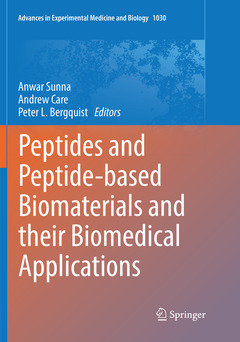Description
Peptides and Peptide-based Biomaterials and their Biomedical Applications, Softcover reprint of the original 1st ed. 2017
Advances in Experimental Medicine and Biology Series, Vol. 1030
Coordinators: Sunna Anwar, Care Andrew, Bergquist Peter L.
Language: English
Subject for Peptides and Peptide-based Biomaterials and their...:
Publication date: 08-2018
Support: Print on demand
Publication date: 11-2017
Support: Print on demand
Description
/li>Contents
/li>Biography
/li>Comment
/li>
Programmable Bio-Surfaces for Biomedical Applications.- Solid-binding Peptides in Biomedicine.- Molecular Modelling of Peptide-based Materials for Biomedical Applications.- Design principles of peptide based self-assembled nanomaterials.- Bioprinting and Biofabrication with Peptide and Protein Biomaterials.- Peptides as Bio-Inspired Molecular Electronic Materials.- Peptide-Based Materials for Cartilage Tissue Regeneration.- Peptides and Drug Delivery.- Peptide Lipidation – A Synthetic Strategy to Afford Peptide Based Therapeutics.- Molecular Engineering of Conus Peptides as Therapeutic Leads.- Uptake Mechanism of Cell-Penetrating Peptides.- Empowering the Potential of Cell-Penetrating Peptides for Targeted Intracellular Delivery via Molecular Self-Assembly.- The Current Role of Cell-Penetrating Peptides in Cancer Therapy.




